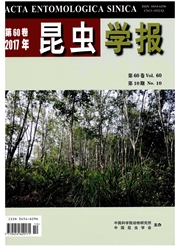

 中文摘要:
中文摘要:
细胞凋亡指细胞受基因调控的自主的细胞死亡过程,是细胞为维持内环境稳态的一种手段。家蚕Bombyx mori是重要的鳞翅目模式昆虫,对其细胞凋亡机制的研究具有代表性。家蚕细胞凋亡不仅参与了整个变态发育过程,而且在家蚕天然免疫反应中扮演着重要角色。在家蚕卵-幼虫-蛹-成虫各阶段通过凋亡基因的调控促进组织退化及冗余细胞的清除,并且在家蚕抗家蚕核型多角体病毒(Bm NPV)过程中,细胞凋亡的发生对Bm NPV增殖的抑制也有着重要作用。本文就近年来家蚕细胞凋亡诱导因素、细胞凋亡相关基因的研究现状及通路和细胞凋亡对家蚕发育影响的研究进展进行综述,为解决目前家蚕细胞凋亡机制研究不足、内质网通路涉猎少、各通路间联系不清晰等问题,以及深入研究家蚕细胞凋亡并解析家蚕变态发育机制和天然免疫反应提供参考。
 英文摘要:
英文摘要:
Apoptosis is the cell autonomic decease by gene controlling to maintain the homeostasis of ceils. Studying the mechanisms of apoptosis in the silkworm, Bombyx mori, an important model of Lepidoptera, has the representative significance. Apoptosis in the silkworm not only participates in the metamorphosis, hut also in the natural immunity. Apoptosis plays an important role in promoting tissue degradation and removing redundant cells in the egg-larva-pupa-adult stages of B. mori through the regulation of apoptosis-related genes, and in the inhibition of B. mori nucleopolyhedrovirus (BmNPV) proliferation. In this article we reviewed the advances in the apoptosis-inducing factors, apoptosis-related genes and pathways in B. mori, and the effects of apoptosis on the development of B. mori in recent years, which will facilitate to deeply resolve such problems as the mechanism research on apoptosis not enough, the pathway of endoplasmic reticulum rarely explored and the linkage between various pathways unclear and so on, and lay the foundation for studying the mechanism of metamorphosis and the system of autoimmune in B. mori.
 同期刊论文项目
同期刊论文项目
 同项目期刊论文
同项目期刊论文
 期刊信息
期刊信息
